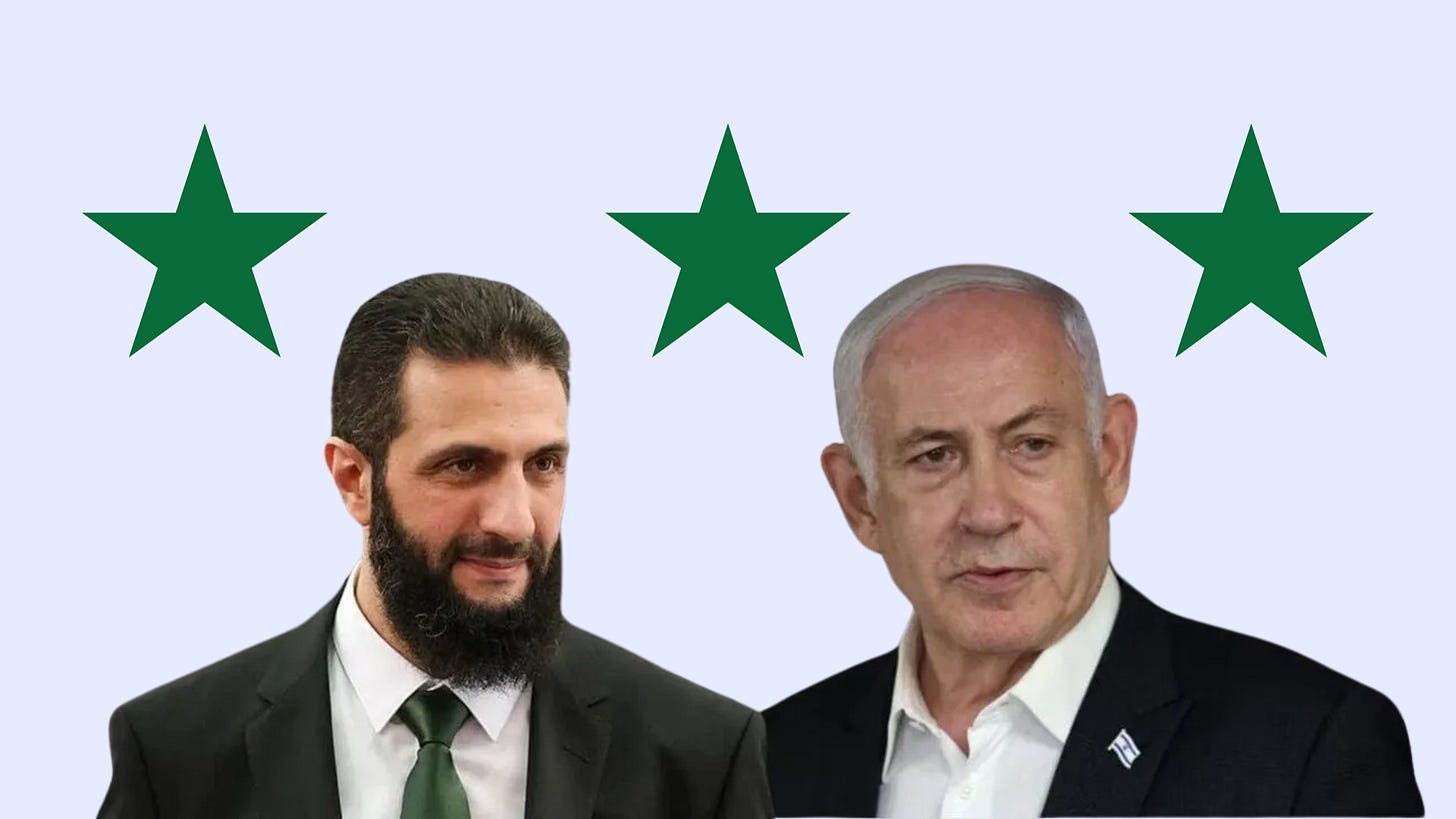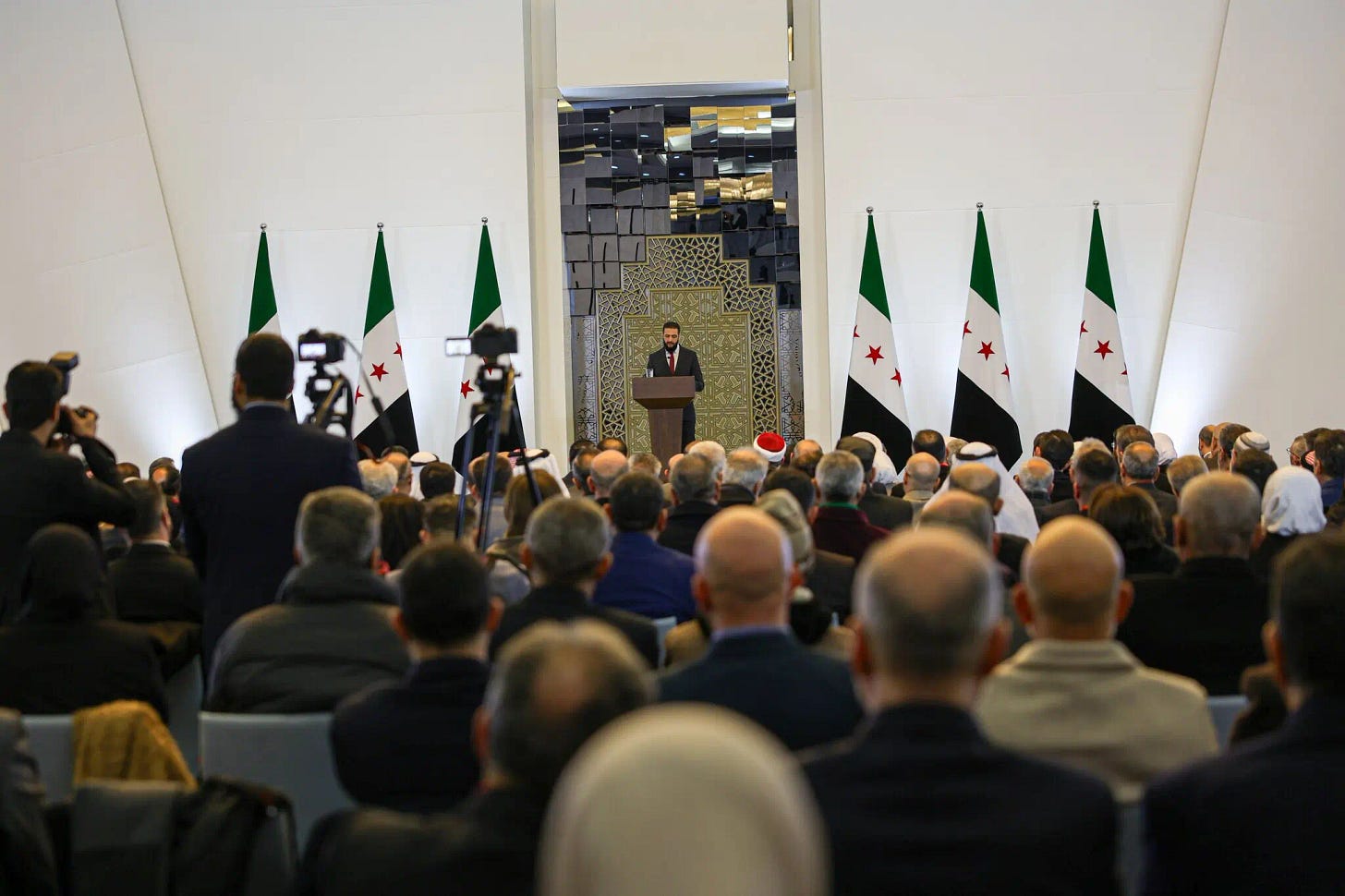Borderline Behavior: What is Israel doing in Syria?
💬 An old (wonderfully cinical) quote about Lebanon goes something like: ‘If you have understood everything about Lebanon, it means they’ve explained it to you wrong’.
In geopolitical terms, it’s called ‘the Lebanonization of a conflict’. With that being said, welcome to Syria.
💥 Yesterday, Israel has struck (read: attacked) what it’s described as military sites near Damascus and across Syria’s south (near Israel). Why? The defense minister, Israel Katz, says it won’t let southern Syria become another “southern Lebanon”—ie, a stronghold for hostile forces (to Israel) like Hezbollah.
Much has been said about Mr. Netanyahu these past few years, but few events can be compared to shooting yourself in the foot like this one, which is sure to exasperate the international community even more.
But first:
⚔️ A recap on Israel and Syria
📌 On December 8th 2024, Israeli PM Netanyahu announced the end of the 1974 ceasefire agreement on the Golan Heights, and IDF ground units took control of the Syrian side of Mount Hermon in the occupied Golan Heights. IDF ground units since then have operated in the Quneitra and Daraa Governorates, mostly searching and dismantling weapons caches and more broadly military infrastructure from the ex-Syrian Arab Army (SAA) as well as Hezbollah.
📌 The Israeli incursion has led to direct interactions between IDF servicemen and Druze Syrian civilians residing in the Syrian Golan Heights. On December 12th, IDF officers held meetings with local leaders in the Golan, as Druze leaders declared in a video that Israel should annex their villages as a “lesser evil” due to "fear from Islamic groups in Syria".
📌 Later on February 23rd, a Druze militant group calling itself the Suwayda Military Council announced its formation, openly rejecting the authority of the HTS-led transitional government.
Interestingly, Netanyahu also said that Israel would “not tolerate any threat “to the Syrian Druze community (how magnanimous!). As a result, Syrians came out in countrywide protest in the southern governorates of Daraa and Suwayda, as well as Rif Dimashq, Lattakia, Tartous, Aleppo, and Damascus.
But of course, from the perspective of Syria’s new rulers, any allegations of geopolitical hypocrisy fade against the hard reality of its neighbors now violating its sovereignty.
Beyond the missiles and statements, this all raises three big questions.
🔎 First, why did Israel strike now?
🇺🇸 Two major developments have taken place. First, the United States has appointed a new Director of National Intelligence, Tulsi Gabbard, who has long emphasized the importance of defeating al-Qaeda in Syria and other regions—placing that goal above regime change efforts, such as removing Syria’s Assad.
This perspective increasingly aligns with concerns in Israel, where senior official Gideon Saar has labeled Syria’s emerging leadership as an "Islamic jihad terrorist group," referencing Hayat Tahrir al-Sham (HTS), a faction with historical ties to al-Qaeda that now holds significant influence in Syria.
While the Biden administration and European governments have eased sanctions and lifted bounties on HTS, accepting claims that the group severed its al-Qaeda connections years ago, Israel remains skeptical. Its security forces continue targeting factions in Syria, particularly those operating near its borders. But why now?
Syria’s transitional government has just concluded a rare national dialogue, an effort to reconcile internal divisions and move toward stability. Israel may have seized this moment to act— whether to
assert its presence in Syria’s evolving political landscape,
exploit a period of internal focus among armed groups
disrupt any potential consolidation of power that could strengthen Syria in the long run.
or what is more likely, proceed to establish a ‘cantonization’ of Syria, ensuring that a fragmented country would never pose a challenge to its regional dominance.
🌍 Second, how is the rest of the world reacting?
For now, mostly with silence. While the international community (by-and-large) views Syria’s transition away from Assad as a net positive, key regional and international powerbrokers are now busy either tackling the Russo-Ukraine war, which is back on the front pages, or figuring out phase two of the Israel-Hamas truce.
But that silence can also be revealing. While key Gulf states are emerging as Syria’s primary financial backer and Turkey is muscling in as Syria’s key security partner, all are fundamentally competing for influence—and a powerful, united, and independent Syria might not always be the outcome they’re seeking. (Remember, historically, Syria was always considered the cradle of Arabism).
⚠️ Then third, would demilitarization even be enough for Israel?
🇮🇱 Netanyahu has called for a fully demilitarized southern Syria, but it’s unclear how exactly that would look (let’s put the hypocrisy aside for a second)—at its core, any stable and effective government involves having a monopoly over the use of force. (lest it turn into another Lebanese or Iraqi state).
That’s partly why Syria’s new rulers are attempting to unify the country's armed groups under a Syrian flag. Without that, you don’t have a nation—you have warlordism.
So then, is there a way for Syria to hit this basic milestone while satisfying Netanyahu’s demands? Syria’s new leader (al-Sharaa) has offered assurances that he seeks no conflict and is willing to uphold the 1973 Israel-Syria separation of forces agreement, but Netanyahu isn’t exactly the trusting type (nor the trusted type as he has repeatedly shown to break promises and assurances to world leaders in the past)
Not so fun fact: Jacques Chirac, then president of France, had the measure of Netanyahu more than two decades ago. He famously quipped: ‘He’s a liar and a bully. All his policy centers around provoking the Palestinians’.
Nicolas Sarkozy also reflected upon Barack Obama about Netanyahu ‘He’s a liar. I can’t stand him’—(Can anyone?)
🚩 While the HTS-led authorities in Syria have so far adopted a conciliatory tone towards Israel, only lodging complaints at the UN for violating the country’s sovereignty, these actions are likely to create tensions (to say the least).
This is despite Israeli leaders showing no sign of any willingness to return or even negotiate on these captured territories; in fact, on January 26th, Israeli Minister of Defense Katz said the IDF would remain “indefinitely” on the Syrian side of Mount Hermon.
Tel Aviv’s outreach to Druze communities and its potential support for armed groups in southern Syria could pave the way for a long-term occupation, similarly to how the IDF relied in part on the Southern Lebanese Army (SLA) for its occupation of southern Lebanon.
In the short term, HTS-led forces are unlikely to be able or willing to challenge Israel given their current diminished capabilities.
However, Damascus is quickly building a close security relationship with Ankara, which could see a buildup of its army with Turkish hardware and training services; that is likely to aggravate an already tense relationship between Israel and Turkey and could lead the former to firmly support Druze armed groups in the south as a counterbalance.
The other question is whether Syria might instead lean on Turkey to pressure Israel to back off. But first…
🇹🇷 A bit of background on the Syria-Turkey relationship:
The rise to power of Hayat Tahrir al-Sham (HTS) in Syria had led to an amount of Turkish influence in the country not seen virtually since the Ottoman Empire. At the same time, both Turkey (now Türkiye, good rebranding, right?) and Israel have stepped up efforts to secure their respective interests in the country, a dynamic likely to lead to further destabilization and potentially slow the recovery of a nation scarred by a decade of war.
On February 4th, 2025, former HTS leader and current Syrian interim President Ahmad al-Sharaa traveled to Turkey, where he met President Erdogan. Reuters reported that parties discussed a joint defense pact that could see the establishment of new Turkish airbases in the Syrian desert, as well as Turkish advisors training the new HTS-led Syrian armed forces.
But while Erdogan has long been a staunch critic and his Foreign Minister has called Israel’s moves in Syria "expansionist" (Is he wrong?) Turkey itself has dozens of bases and outposts across northern Syria under the pretext of establishing its very own buffer zone against the Kurds.
So even with the acquiescence of HTS, Turkey’s own bigger military footprint in Syria arguably undermines its authority to condemn Israel. Oh, and if you look carefully, Israel has already been building its own narrative to justify any military presence within Syria, increasingly positioning itself as a protector of the minority Druze community.
🧐 What to make of all this?
The state of Syria’s destroyed cities illustrates the grave challenges that the country will face in reconstituting its territory, defending its borders, or even offering the population a sense of basic stability.
Pick any spot on a map, and the geopolitical game is often fundamentally the same: deterrence without destabilization. But at this tentative stage of Syria’s post-Assad life, Israel (especially now with Trump in office) has now seemingly calculated it would rather not underindex on deterring its foes.
And yet, while post-Assad Syria clearly has extremist elements, the risk of preemptively hitting other parts of Syria is that you could end up merely vindicating—and playing into the narrative of—those very same extremists. Something Israel has been so keen on doing for the past 50 years, especially with its direct neighbors (More on that in subsequent articles)
The worry is that Israel, with its current actions, might just as well end up creating a Syrian version of Hezbollah in southern Syria.
Welcome to the neverending loop of Middle Eastern politics…
✍🏻 Also worth noting:
Local reports suggest Syria’s main Kurdish leaders weren’t invited to the national dialogue in Damascus.
Notice I haven’t used the Syrian flag as an Emoji. That’s because it hasn’t been changed yet from the red-white flag with two stars to the green-white flag with three stars







Excellent and informative piece Alexandre!